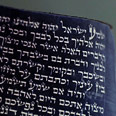
In Parashat Mattot we read that after the conquest of Transjordan, the tribes of Reuben and Gad, which owned large herds, asked to remain in Transjordan and enjoy its good pasture, rather than cross the Jordan into Canaan (Numbers 32:1-6). Moses’ reply – “Are your brothers to go to war while you stay here?” – reflects his disappointment in seeing that the change of generations has not brought the expected change in values. The new generation does not have a nationalistic sense. It does not understand that the nation as a whole has a destiny to fulfil in its homeland. Instead, it looks only to its own self-interest and to its property. Worse yet, after Moses reminds the tribes of the sins of their fathers and of God’s response, he points out that their example may dissuade the rest of the Israelites from crossing the Jordan, which may anger God and leave Israel wandering in the desert.
Ultimately, Moses reaches a compromise. The “rebels” will be granted their request, on condition that they participate in the war to conquer the Land of Israel and divide it among the remaining nine and a half tribes (including half of Menashe) (Numbers 32:16-33).
Moses’ decision to attend to the crisis himself shows that for him the journey is not yet over. The person who errs must be given another chance. The only way to influence the people and correct its ways is through education. Even if Moses may have hoped that the tribes of Reuben and Gad would accept his position, their response reveals that the priorities are different (Numbers Rabba 22:9), and while they agree to lead their brethren in battle, they do so grudgingly, as “a commandment learned by rote” (Isaiah 29:13) in order to achieve their true desire. Yet, nevertheless, Moses reaches a compromise with them, and immediately turns his concern to the commandments that the people must fulfil in its homeland.
This educational model is repeated in Masei. Moses lists all of “the marches of the Israelites” (Numbers 33:1) so that the people “might recall the miracles God wrought for them” and by which they have survived to this day (Numbers Rabba 23:1-49), and then immediately turns his attention to the commandments upon which inheriting the Land of Israel depends if they are to settle there permanently. Here, too, planning for the nation’s future depends upon the memory of its past.
The conception of Israel in these parashot is clear: Israel was not intended to wander. Its marches were those of a nation marching to a defined objective – to permanent settlement in its ancestral home, for only there can it be whole. It must fulfil its destiny of truth, justice and charity so that all nations may be blessed, as the prophet Jeremiah explains in the haftarah to Masei (Jeremiah 4:1-2). The nation’s wanderings in the desert, and the retreats and exiles that will follow its inheritance of the Land when the nation does not fulfil God’s commandments, are chapters in a journey but not a permanent state. As the midrash teaches us, the tribes of Reuben and Gad were the first to be punished and the first to be exiled “because they dwelled outside of the Land of Israel” and “separated themselves from their brethren for the sake of their property” (Numbers Rabba 22:7).
We learn from the biblical story that we are a nation on a journey that has not yet ended, and the nation has not yet learned all that it must to understand its destiny. This is an important lesson in light of the various “Diasporic” conceptions and the schism between Jewish existence in Israel and the Diaspora, in which most of the nation lives in abroad, apparently continuing to believe – in the words of M.J. Berdyczewski – that “wandering is its way of life” (Writings of M.J. Berdyczewski, p. 47). Hazak, hazak ve-nithazek - be strong, be strong, and we shall be strengthened.
Dr Sarah Strassberg-Dayan is a lecturer in Jewish thought at the Schechter Institute















